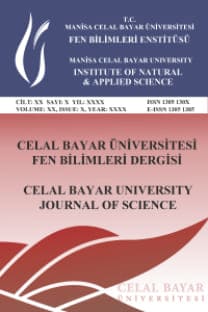TEK KATLI YAPRAK YAYLARDA SONLU ELEMANLAR YÖNTEMİ İLE YORULMA ANALİZİ - FATIGUE ANALYSIS OF SINGLE LEAF SPRINGS WITH FINITE ELEMENT METHOD
Yorulma , yaprak yay, sonlu elemanlar yöntemi / Fatigue , leaf springs, finite element method.
FATIGUE ANALYSIS OF SINGLE LEAF SPRINGS WITH FINITE ELEMENT METHOD
Fatigue , leaf springs, finite element method,
___
- Manual on design and application of leaf springs, SAE International, 978-0-89883-383-6, 1980.
- Corvi A, A preliminary approach to composite beam design using finite element analysis, Composite Structures, 16 ,259-275, 1990.
- Güven, N., Temiz, V., Parlar, Z., "Evaluation of leaf spring design and fatigue life", International Conference on Advances in Materials and Processing Technologies, 2011.
- Esen, Ö., "Kompozit Yaprak yaylarda sonlu elemanlar yöntemi ile yorulma analizinin yapılması", Yüksek Lisans Tezi, Balikesir Üniversitesi Fen Bilimleri Enstitüsü, Balıkesir, 2009.
- Kumar M.S., Vijayarangan S., “Static analysis and fatigue life prediction of steel and composite leaf spring for light passenger vehicles”, Journal of Scientific & Industrial Research, 66, 128-134, 2007.
- Shokrieh, M., Rezaei, "Analysis and optimization of a composite leaf spring", Composite Structures, 60, 317–325, 2003.
- Soner, M., Güven, N., Erdogus, T., Karaagaç, M., "Parabolic leaf spring design optimization considering FEA and rig test correlation", SAE Commercial Vehicle Engineering Congress, USA, 11CV-0013, 2011.
- Saarstahl - 51CrV4 (50CrV4) Material specification Sheet.
- Meran, C., Yüksel, M., “Malzeme Bilgisine Giriş”, Cilt 2,TMMOB Makine Mühendisleri Odası,251-252, 2010.
- ISSN: 1305-130X
- Yayın Aralığı: 4
- Başlangıç: 2005
- Yayıncı: Manisa Celal Bayar Üniversitesi Fen Bilimleri Enstitüsü
Mustafa ŞAHİN, Yüksel OĞUZ, Fuat BÜYÜKTÜMTÜRK
UNDRAINED RESPONSE OF LOOSE FIBER REINFORCED SAND
AA 2024 ALAŞIMININ ARTIŞLI ŞEKİLLENDİRİLEBİLİRLİĞİNİN İNCELENMESİ
PERFORMANS SIRALAMASI YÖNTEMİYLE MEVCUT BİNALARIN BÖLGESEL DEPREM RİSK DAĞILIMININ BELİRLENMESİ
